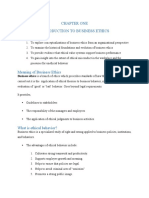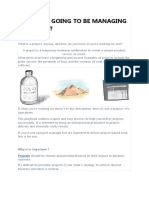0 ratings0% found this document useful (0 votes)
61 viewsUnity University: Name Mahlet Tesfaye
Unity University: Name Mahlet Tesfaye
Uploaded by
አረጋዊ ሐይለማርያምThis document contains an individual assignment submitted by Mahlet Tesfaye for their course on the Ethical and Legal Environment. It includes responses to two discussion questions.
The first question asks why we care about business ethics as part of society. Mahlet responds that we care about ethics because it reflects the type of people we are, and that business ethics helps improve society and guide decision making, increasing productivity.
The second question asks if ethics and profitability can co-exist. Mahlet argues that ethical companies like Tata Group show they can be both ethical and profitable. However, others contend that maximizing short term profits requires compromising ethics, and focusing on ethics may reduce short term gains. Overall,
Copyright:
© All Rights Reserved
Available Formats
Download as DOCX, PDF, TXT or read online from Scribd
Unity University: Name Mahlet Tesfaye
Unity University: Name Mahlet Tesfaye
Uploaded by
አረጋዊ ሐይለማርያም0 ratings0% found this document useful (0 votes)
61 views7 pagesThis document contains an individual assignment submitted by Mahlet Tesfaye for their course on the Ethical and Legal Environment. It includes responses to two discussion questions.
The first question asks why we care about business ethics as part of society. Mahlet responds that we care about ethics because it reflects the type of people we are, and that business ethics helps improve society and guide decision making, increasing productivity.
The second question asks if ethics and profitability can co-exist. Mahlet argues that ethical companies like Tata Group show they can be both ethical and profitable. However, others contend that maximizing short term profits requires compromising ethics, and focusing on ethics may reduce short term gains. Overall,
Original Title
mah tesf ass
Copyright
© © All Rights Reserved
Available Formats
DOCX, PDF, TXT or read online from Scribd
Share this document
Did you find this document useful?
Is this content inappropriate?
This document contains an individual assignment submitted by Mahlet Tesfaye for their course on the Ethical and Legal Environment. It includes responses to two discussion questions.
The first question asks why we care about business ethics as part of society. Mahlet responds that we care about ethics because it reflects the type of people we are, and that business ethics helps improve society and guide decision making, increasing productivity.
The second question asks if ethics and profitability can co-exist. Mahlet argues that ethical companies like Tata Group show they can be both ethical and profitable. However, others contend that maximizing short term profits requires compromising ethics, and focusing on ethics may reduce short term gains. Overall,
Copyright:
© All Rights Reserved
Available Formats
Download as DOCX, PDF, TXT or read online from Scribd
Download as docx, pdf, or txt
0 ratings0% found this document useful (0 votes)
61 views7 pagesUnity University: Name Mahlet Tesfaye
Unity University: Name Mahlet Tesfaye
Uploaded by
አረጋዊ ሐይለማርያምThis document contains an individual assignment submitted by Mahlet Tesfaye for their course on the Ethical and Legal Environment. It includes responses to two discussion questions.
The first question asks why we care about business ethics as part of society. Mahlet responds that we care about ethics because it reflects the type of people we are, and that business ethics helps improve society and guide decision making, increasing productivity.
The second question asks if ethics and profitability can co-exist. Mahlet argues that ethical companies like Tata Group show they can be both ethical and profitable. However, others contend that maximizing short term profits requires compromising ethics, and focusing on ethics may reduce short term gains. Overall,
Copyright:
© All Rights Reserved
Available Formats
Download as DOCX, PDF, TXT or read online from Scribd
Download as docx, pdf, or txt
You are on page 1of 7
Unity University
Course Title: Ethical and legal Environment
Individual Assignments
NAME MAHLET TESFAYE
SECTION B
1, why do we, as part of the society, care about
business ethics? Discuss
We care about ethics that’s because we are all aware of the idea
that how we act reflects what kind of people are we. Business
ethics is not very strict, that’s why we need to do some actions
where in a little amount of respect is visible.
Whether we are working in business industry or not, we should
always care about ethics in general. Because business ethics helps
as to attention to business ethics has substantially improved
society and help maintain a moral course in turbulent times.
Ethics also employees make better decisions in less time with
business ethics as a guiding principle this increase productivity
and overall employee morale. When employees complete work in
a way that is based on honesty and integrity, the whole
organization benefits.
Business ethics is a form of applied ethics that examines ethical
principle and moral problems that arise in a business environment
Whenever we start talking about obligations that are not
generated by the low, we are talking about ethics. So we want to
know what ethical obligation or responsibility’s we would have as
a business person. Even if we think that our only responsibility is
to shareholders, that’s still an ethical responsibility.
Employees make better decisions in less time with business ethics
as a guiding principle this increase productivity and overall
employee morale. When employees complete work in a way that
is based on honesty and integrity, the whole organization
benefits.
If we are not ethical in business ever, how can we ever say we are
ethical in our personal life? Our system treats unethical behaviors
differently. We treat serial killers with an expensive painless
death, but handle white collar crimes with minimal consequences.
Ethical values also help guide more effectively with ethical
dilemmas by eliminating those behaviors that do not conform to
our sense of right and wrong our best rational interest without
sacrificing others.
2, can ethics and profitability co-exist? Make a critical
reflection by raising the contending argument on the
issue.
Yes, ethics and profitability can co-exist the biggest example
of ethics such as Tata group which is an Indian multinational
conglomerate company. The combined market capitalization
of all the 32 listed Tata companies was $96.87 billion as of
Sep 2013. Tata receives more than 58% of its revenue from
outside India.
Tata group is famous for its ethical practices. Here is an
example of Tata ethics.
Co-existence there is one and only social responsibility of of
business and that is to use its resources and engage in
activities designed to increase its profiles so long as it says
within the rules of the game, which is to say engages in open
and free competition without deception or fraud.
Being ethical limits profit companies who claims to be
ethical, often have ethics only in their words, not in action.
Business is done with the aim of producing maximum profit
whereas ethics is about what is right and wrong. This two
can’t go together, if we want to be success immediately.
Ethical companies and employees are more successful.
Companies with a strong ethical foundation tend to do
better financially, have higher rates of employee retention
and higher customer service satisfaction numbers.
Also factors play an important role in making a business
profitable which includes dedicated and productive
employees, expert management teams and consistent
consumer demand.
By the following ethics in business, organizations can make
correct judgment and decide what is right and wrong for
them.
For example if we can take a coffee powder manufacturing
company which strictly follows business ethics, use the
beans which are picked without causing deforestation.
The most ethical business are not the most profitable
because ethical companies instill the culture that being
more ethical than another company with produce more
profit this is false statement.
Maximizing profits is focus on what the company does well
and how to extort those factors.
The short term profits of unethical company and focus to
provide the maximum reward for investors pay off.
Focusing on ethical culture in the work place, cut time for
maximizing revenue and degrades the employees by
ingraining ethical standard are greater than the monetary
gains that could be earned.
You might also like
- WSP HR Employee Handbook May2019Document56 pagesWSP HR Employee Handbook May2019Pravin Awalkonde100% (1)
- Hes Into Her Season 2Document3,207 pagesHes Into Her Season 2Apple Mae Managuelod90% (10)
- Conduct Competency Assessment SCRIPTDocument4 pagesConduct Competency Assessment SCRIPTFrancis E Cadallo95% (19)
- Unity University Department of Mba Ethics and Legal Environment AssignmentDocument7 pagesUnity University Department of Mba Ethics and Legal Environment Assignmentአረጋዊ ሐይለማርያም100% (1)
- What Is Ethics?Document4 pagesWhat Is Ethics?Suhumar Rock OnNo ratings yet
- Chapter 5 - Ethical IssuesDocument22 pagesChapter 5 - Ethical IssuesCyrishNo ratings yet
- Business EthicsDocument27 pagesBusiness EthicsEllen M. KarganillaNo ratings yet
- Ethical Issues in The Business: Business Ethics Are Moral Principles That Guide The Way A Business BehavesDocument10 pagesEthical Issues in The Business: Business Ethics Are Moral Principles That Guide The Way A Business BehavesQaisar BasheerNo ratings yet
- Business Ethics Module 1Document20 pagesBusiness Ethics Module 1Sreejith C S SreeNo ratings yet
- Ch.1 BUSINESS ETHICSDocument14 pagesCh.1 BUSINESS ETHICSGanesh OfficialNo ratings yet
- BECG MaterialDocument12 pagesBECG MaterialC Rani100% (2)
- Present As IDocument8 pagesPresent As ILaila SekarNo ratings yet
- Business Ethics - Study NotesDocument30 pagesBusiness Ethics - Study NotesMimansha SharmaNo ratings yet
- Resolving An Ethical Dilemma: Know The PrinciplesDocument6 pagesResolving An Ethical Dilemma: Know The PrinciplesdushyantNo ratings yet
- Business Eithics IDocument21 pagesBusiness Eithics IMohini MalakarNo ratings yet
- Corporate EthicsDocument7 pagesCorporate EthicsSaima Binte IkramNo ratings yet
- Chapter 3 - THC 123Document11 pagesChapter 3 - THC 123Julius O. BasalloNo ratings yet
- Buisness EthicsDocument18 pagesBuisness EthicsEvanson KariukiNo ratings yet
- BE & CG NotesDocument144 pagesBE & CG NotesswapnilNo ratings yet
- Business LawDocument5 pagesBusiness Lawtanvir01712No ratings yet
- Integration Thesis Business EthicsDocument4 pagesIntegration Thesis Business Ethicsaflpbpcnhjpwkd100% (1)
- Business EthicsDocument3 pagesBusiness EthicsShania Trisha Serrantes LeeNo ratings yet
- Business Ethics2Document13 pagesBusiness Ethics2Savya JaiswalNo ratings yet
- Ethics Analysis (Hosmer Model) : The Nature of Ethics in ManagementDocument10 pagesEthics Analysis (Hosmer Model) : The Nature of Ethics in ManagementIshita RanaNo ratings yet
- Business EthicsDocument12 pagesBusiness EthicsSubhan AliNo ratings yet
- Business Ethics - Sem 4 - Notes-1Document42 pagesBusiness Ethics - Sem 4 - Notes-1mnamala561No ratings yet
- Ethics 1Document38 pagesEthics 1Ryan MiguelNo ratings yet
- ESDDocument2 pagesESDAkankshaNo ratings yet
- Ethics and Corporate Social Responsibility SlideDocument30 pagesEthics and Corporate Social Responsibility Slidetanymislam70iuNo ratings yet
- Business Ethics-POMDocument9 pagesBusiness Ethics-POMVijay ChaursiyaNo ratings yet
- What Is Ethics?: Ethics, Also Known As Moral PhilosophyDocument90 pagesWhat Is Ethics?: Ethics, Also Known As Moral Philosophyravi n100% (1)
- Business Ethics: Project Report OnDocument29 pagesBusiness Ethics: Project Report OnIshika ChoudharyNo ratings yet
- Project Report On Business EthicsDocument28 pagesProject Report On Business Ethicssony pandia60% (5)
- Academic Script-2 PDFDocument10 pagesAcademic Script-2 PDFIrving100% (1)
- UCD2F1209Document17 pagesUCD2F1209sharvin05No ratings yet
- Unit 3Document10 pagesUnit 3Amit SonaraNo ratings yet
- Ethics and Entrepreneurship Full PaperDocument5 pagesEthics and Entrepreneurship Full PaperAparna GanesanNo ratings yet
- NewsletterDocument4 pagesNewsletterElfawizzyNo ratings yet
- Business EthicsDocument19 pagesBusiness EthicsSonny Boy SajoniaNo ratings yet
- Chapter One Introduction To Business Ethics Learning ObjectiveDocument8 pagesChapter One Introduction To Business Ethics Learning ObjectiveMohamud OrsheNo ratings yet
- Business EthicsDocument12 pagesBusiness Ethics20020920-030No ratings yet
- Ethical Perspectives 2Document46 pagesEthical Perspectives 2Merry IbañezNo ratings yet
- 11 Intl Biz EthicsDocument19 pages11 Intl Biz Ethicsskkarim90No ratings yet
- Business EthicsDocument4 pagesBusiness Ethicsbkiprop2605No ratings yet
- Ethical Delemma in BusinessDocument27 pagesEthical Delemma in BusinessLaarnie ManglicmotNo ratings yet
- 1.ethics & BusinessDocument6 pages1.ethics & BusinessCamae LamigoNo ratings yet
- CASES +role of Business Ethics in Modern OrganizationsDocument67 pagesCASES +role of Business Ethics in Modern OrganizationsNamrata KishnaniNo ratings yet
- Business EthicsDocument45 pagesBusiness Ethics2093 RAHUL SURYA SNo ratings yet
- The Importance of Ethics in The Business WorldDocument6 pagesThe Importance of Ethics in The Business WorldAyisOgaNo ratings yet
- Give Reasons That A Business Should Be Run EthicallyDocument5 pagesGive Reasons That A Business Should Be Run Ethicallysoni0% (1)
- Business Ethics Are Moral Principles That Guide The Way A Business BehavesDocument5 pagesBusiness Ethics Are Moral Principles That Guide The Way A Business BehavesKarlo0% (1)
- Corporate EthicsDocument53 pagesCorporate EthicssayedNo ratings yet
- Ee 6Document39 pagesEe 6yathigowda68No ratings yet
- CHAPTER 2 BusinessDocument19 pagesCHAPTER 2 Businessvutominhlamulo8No ratings yet
- BUSINESS-ETHICS (5) (AutoRecovered)Document9 pagesBUSINESS-ETHICS (5) (AutoRecovered)Sivan JacksonNo ratings yet
- Week 1 DQ 1 Business LawDocument4 pagesWeek 1 DQ 1 Business LawPrijmaNo ratings yet
- Unit - IVDocument18 pagesUnit - IVRammohanreddy RajidiNo ratings yet
- Business EthicsDocument2 pagesBusiness Ethicsmudsarjabbar628No ratings yet
- Legal An D UnethicalDocument8 pagesLegal An D UnethicalsoniNo ratings yet
- Academic Script PDFDocument11 pagesAcademic Script PDFShihab ChiyaNo ratings yet
- Business Ethics and Corporate Governance-UNIT-1 Lecture NotesDocument15 pagesBusiness Ethics and Corporate Governance-UNIT-1 Lecture NotesTapaswini NayakNo ratings yet
- Business Ethics For The Modern Man: Understanding How Ethics Fits Into The Business PlaceFrom EverandBusiness Ethics For The Modern Man: Understanding How Ethics Fits Into The Business PlaceRating: 5 out of 5 stars5/5 (1)
- Regular Program®: Department of Management Post Graduate ProgramDocument5 pagesRegular Program®: Department of Management Post Graduate Programአረጋዊ ሐይለማርያም100% (1)
- Regular Program®: Department of Management Post Graduate ProgramDocument22 pagesRegular Program®: Department of Management Post Graduate Programአረጋዊ ሐይለማርያምNo ratings yet
- Regular Program®: Department of Management Post Graduate ProgramDocument37 pagesRegular Program®: Department of Management Post Graduate Programአረጋዊ ሐይለማርያም50% (2)
- Regular Program®: Department of Management Post Graduate ProgramDocument24 pagesRegular Program®: Department of Management Post Graduate Programአረጋዊ ሐይለማርያምNo ratings yet
- SensorDocument52 pagesSensorአረጋዊ ሐይለማርያምNo ratings yet
- Roles in Project ManagementDocument18 pagesRoles in Project Managementአረጋዊ ሐይለማርያም100% (1)
- Hope University CollegeDocument92 pagesHope University Collegeአረጋዊ ሐይለማርያም100% (3)
- Master of Business Administration Course Title: Financial Management Course Number: MBA731Document1 pageMaster of Business Administration Course Title: Financial Management Course Number: MBA731አረጋዊ ሐይለማርያምNo ratings yet
- EM Budget and Plan For 2019-20 Fiscal YearDocument55 pagesEM Budget and Plan For 2019-20 Fiscal Yearአረጋዊ ሐይለማርያምNo ratings yet
- So You'Re Going To Be Managing A Project?: Why It Is Important ?Document8 pagesSo You'Re Going To Be Managing A Project?: Why It Is Important ?አረጋዊ ሐይለማርያምNo ratings yet
- Three Monthly Major Activities and Shut - Down Maintenance Activity Detail Action Plan.Document7 pagesThree Monthly Major Activities and Shut - Down Maintenance Activity Detail Action Plan.አረጋዊ ሐይለማርያምNo ratings yet
- MIK-Assignment 3 Gedion HailemariamDocument3 pagesMIK-Assignment 3 Gedion Hailemariamአረጋዊ ሐይለማርያምNo ratings yet
- Unity University: Submitted To: - Mesfin Abebe (PHD) January 24, 2020Document14 pagesUnity University: Submitted To: - Mesfin Abebe (PHD) January 24, 2020አረጋዊ ሐይለማርያምNo ratings yet
- MIS Menen AdefrisDocument2 pagesMIS Menen Adefrisአረጋዊ ሐይለማርያምNo ratings yet
- MI&K Eyuti 3Document7 pagesMI&K Eyuti 3አረጋዊ ሐይለማርያምNo ratings yet
- Management Concepts and Thoughts - 2020Document8 pagesManagement Concepts and Thoughts - 2020አረጋዊ ሐይለማርያም100% (1)
- Mis Eskedar TesfayeDocument10 pagesMis Eskedar Tesfayeአረጋዊ ሐይለማርያምNo ratings yet
- Mis 1 Fikirte TadeleDocument3 pagesMis 1 Fikirte Tadeleአረጋዊ ሐይለማርያምNo ratings yet
- MIS (2) Leulseged KetemaDocument9 pagesMIS (2) Leulseged Ketemaአረጋዊ ሐይለማርያምNo ratings yet
- Mis 2 Menen AdefrisDocument4 pagesMis 2 Menen Adefrisአረጋዊ ሐይለማርያምNo ratings yet
- Unity University Adama Special Campus: Individual AssignmentDocument7 pagesUnity University Adama Special Campus: Individual Assignmentአረጋዊ ሐይለማርያምNo ratings yet
- UNITY UNIVERSITY Mis Assigment Henok AdagnuDocument4 pagesUNITY UNIVERSITY Mis Assigment Henok Adagnuአረጋዊ ሐይለማርያምNo ratings yet
- MIS 3 Menen AdefrisDocument3 pagesMIS 3 Menen Adefrisአረጋዊ ሐይለማርያምNo ratings yet
- Harmbe University College Program: Masters of Business AdministrationDocument3 pagesHarmbe University College Program: Masters of Business Administrationአረጋዊ ሐይለማርያምNo ratings yet
- Illustration of Accounting CycleDocument15 pagesIllustration of Accounting Cycleአረጋዊ ሐይለማርያምNo ratings yet
- SALSAWIT Adeferis MIKDocument28 pagesSALSAWIT Adeferis MIKአረጋዊ ሐይለማርያምNo ratings yet
- University Managing Information and Knowledg Assignment: UnityDocument10 pagesUniversity Managing Information and Knowledg Assignment: Unityአረጋዊ ሐይለማርያምNo ratings yet
- Stator Winding Insulation ResultDocument1 pageStator Winding Insulation Resultአረጋዊ ሐይለማርያምNo ratings yet
- HRM CH IiDocument50 pagesHRM CH Iiአረጋዊ ሐይለማርያምNo ratings yet
- Beza Clinic WorksheetDocument3 pagesBeza Clinic Worksheetአረጋዊ ሐይለማርያምNo ratings yet
- My Inquiry Project ProposalDocument2 pagesMy Inquiry Project Proposalapi-327571756100% (1)
- Memorandum: April 26, 2022 Brookhaven City Council LegalDocument4 pagesMemorandum: April 26, 2022 Brookhaven City Council LegalZachary HansenNo ratings yet
- Care of Dying and DeadDocument10 pagesCare of Dying and Deadd1choosenNo ratings yet
- Persuasive Essay 1Document2 pagesPersuasive Essay 1canisaNo ratings yet
- Caregiver Professional Health EthicsDocument8 pagesCaregiver Professional Health EthicsJoh LaydanNo ratings yet
- Security Guard Premium - Background Report: Legend Check CountDocument10 pagesSecurity Guard Premium - Background Report: Legend Check CountmichaelheardNo ratings yet
- Tourism Policy Handout 8Document6 pagesTourism Policy Handout 8Joana LirioNo ratings yet
- Theory of Cognitive DissonanceDocument7 pagesTheory of Cognitive DissonanceSubhadeep Paul100% (2)
- Code of Ethics PresentationDocument41 pagesCode of Ethics PresentationEmerson Tee100% (3)
- Polytrade V Blanco 30 Scra 187Document3 pagesPolytrade V Blanco 30 Scra 187Dee LMNo ratings yet
- CcSubs Com The Centre S Minute Taking Video enDocument7 pagesCcSubs Com The Centre S Minute Taking Video enelmarcomonalNo ratings yet
- Dr. Romantic and DeontologyDocument4 pagesDr. Romantic and DeontologyJulie XieNo ratings yet
- Psychology PresentationDocument13 pagesPsychology PresentationTeano Jr. Carmelo C.No ratings yet
- Meditatio Talks: Laurence Freeman OsbDocument17 pagesMeditatio Talks: Laurence Freeman Osblisan09No ratings yet
- Fama FraternitatisDocument10 pagesFama Fraternitatistom watersNo ratings yet
- Public Speaking Student HandbookDocument93 pagesPublic Speaking Student Handbooksailingtim100% (6)
- 3 Different Kinds of LoveDocument2 pages3 Different Kinds of Lovesherwin fuleNo ratings yet
- G.R. No. 164785 Soriano Vs - Laguardia PDFDocument31 pagesG.R. No. 164785 Soriano Vs - Laguardia PDFIter MercatabantNo ratings yet
- Guilatco v. City of DagupanDocument2 pagesGuilatco v. City of DagupanGretchen CanedoNo ratings yet
- La Monsrtruosa RadioDocument3 pagesLa Monsrtruosa RadioLuciana BarruffaldiNo ratings yet
- Runaway Negro Creek Georgia Senate ResolutionDocument3 pagesRunaway Negro Creek Georgia Senate Resolutionsavannahnow.comNo ratings yet
- Chapter 2Document4 pagesChapter 2Sela MarieNo ratings yet
- Eric Ed038715Document61 pagesEric Ed038715Abu MusabNo ratings yet
- Contracts CH.2 5Document11 pagesContracts CH.2 5VenNo ratings yet
- Chairmans Report Agm 2014Document3 pagesChairmans Report Agm 2014api-255488102No ratings yet
- Collective Bargaining (CBA)Document6 pagesCollective Bargaining (CBA)AP Dr. Khan Sarfaraz Ali100% (5)
- CircularDocument2 pagesCircularNoorulIslamNo ratings yet























































































































